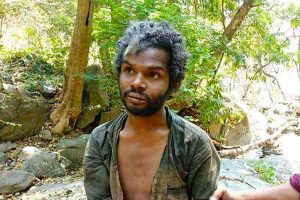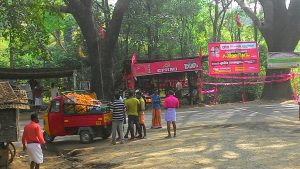Four years after the lynching of Madhu, 19 out of 20 crucial witnesses have turned hostile. Relatives, activists blame the Kerala government.

Chindakky village in Attappady where tribal youth Madhu was lynched by a mob in 2008 (South First/K A Shaji)
With 19 witnesses turning hostile in the lynching case in which mentally challenged Adivasi youth Madhu was beaten to death allegedly by powerful settler community members in Kerala’s tribal heartland Attappady on 22 February 2018, the trial at a special court at Mannarkkad near Palakkad has reached a critical phase.
Except for the 13th witness Suresh, the 19 other witnesses who have been cross-examined till now gave statements to the court that they never saw the lynching and that whatever they placed on record earlier was under intense police pressure.
When contacted by South First, Madhu’s mother Malli alleged that the unprecedented situation in which witnesses turned hostile en masse occurred only because of the lack of commitment on the part of the state government, which willfully delayed the resumption of the trial in the case.
“Both the suspects and witnesses are from our own locality. All the accused have been on bail for the last four years because of the inordinate delay in conducting the trial. So they were able to influence the witnesses by evoking sentiments and promising money,” Malli said.
“The current situation might have been avoided had the trial started just after the filing of the charge sheet. Now, we believe that Madhu will not get any justice,” she added.
Attappady-based tribal rights activist KA Ramu pointed out that the government had appointed a public prosecutor in the case only two years after filing of the charge sheet — that too under intense public pressure. So the trial was delayed.
In the last three months since the trial began, there were four public prosecutors in the case and three among them abdicated their responsibility by saying the government neither provided them the required honorarium nor the basic facilities to reach Mannarkkad and conduct the case.

Tribal youth Madhu just before the lynching in 2018. A picture was circulated then by the attackers claiming that they had nabbed a thief. It was removed from their social media pages later
The then prosecutor Rajendran had lamented that he had to spend ₹1 lakh from his pocket to get xerox copies of crucial documents in the case.
He had said that most of the time, he had to depend on police vehicles to reach the court in Mannarkkad from his residence in Thrissur. This is despite the law that says the government should take care of the travel expenses of public prosecutors.
Rajesh Menon, the present prosecutor, told reporters last week that the situation continues to be the same and he depends on public transport to reach his residence in Palakkad.
Despite the local media calling it a matter of urgent public concern, the government has remained silent on the case.
Coming down heavily on the state government for facilitating a situation in which the witnesses en masse turned hostile, Thiruvananthapuram-based rights activist J Sandhya has pointed out that Kerala is among the states that have not yet implemented the Union Home Ministry’s Witness Protection Scheme of 2018.
“What we are witnessing now is extreme lethargy and insensitivity,” she said.
It appears that even letters written by Madhu’s mother Malli and sister Sarasu to Chief Minister Pinarayi Vijayan were ignored.
Sarasu told South First that the CCTV footage of the crime site proves that the witnesses were present there and saw the brutal killing.
“The videos were played in the open court hall the other day. They stand testimony to our allegation that the witnesses made the volte-face under intense pressure. What is prompting us to doubt the sincerity of the government in the case is that it has not registered any case against the hostile witnesses so far. Only the forest department has suspended a hostile witness who was a watcher with it,” she said.
According to the prosecution, Madhu was attacked by a group of local settlers on the false charge of stealing rice from a grocery shop at Chindakky on the edge of the famous Silent Valley National Park.
The accused are alleged to have tied the hands of Madhu, clicked selfies with him, and then beaten him to death.
In the beginning, the police too only took into account the version of the people said to be responsible for his death.
Based on information spread by the police, vernacular newspapers and television channels reported the next day that a thief who stole rice and provisions from a grocery shop at Chindakky died due to a heart attack while being taken to a police station in an official jeep.
The selfies the accused had posted on social media without thinking much about the implications had created an uproar in favour of the victim. This later resulted in a high-profile investigation that established the lynching of Madhu by the mob.
The probe also revealed that the severely injured youth was handed over to the police, who denied him immediate medical assistance. The tribal youth had collapsed and died in the police jeep while being taken to the station. As per the autopsy, he died of internal bleeding caused by severe blows to the head.

Mukkali town close to Chindakky where Madhu, the tribal youth, was handed over by the attackers to police (South First/ K A Shaji)
“There were many attempts to sabotage the case. A key witness revealed in February itself that some people offered him ₹2 lakh as compensation for taking a stand favourable to the accused. Only a few days ago, some people with covered faces reached Madhu’s hut and threatened his mother and sisters with dire consequences if they continued with the case. The settler community is very much in power, and has the support of the government and political parties,” said Ramu.
According to social activist PE Usha, only strict vigilance on the part of civil society can take the Madhu lynching case to a logical conclusion.
“The state government is duty-bound to investigate and initiate strict action against those who attempt to sabotage the case by threatening the family and offering money to the witnesses,” said Usha, the then state coordinator of Mahila Samakhya society.
According to RJ Rajendraprasad, who heads the tribal NGO Thambu in Attappady, the mysterious murders of tribals and consequent covering-up of cases using political influence are not new.
“Only because of the widespread public attention it evoked has the Madhu lynching case reached even this pathetic present stage. Normally, police are in league with the attackers and drop the cases halfway,” he said. ”In cases registered in Attappady for attacking tribals, the punishment rate is very low,” he said.
According to VS Murukan, who leads the Attappadi Adivasi Action Council, police dropped the Thilakamma murder case (2010) and the Visalakshi murder case (2014) midway. In both cases, FIRs were registered for murder after rape.
Rajendraprasad alleged that over three dozen tribals were murdered in the last two decades, and no justice was delivered to the bereaved families.
Kalichamy, a local tribal youth, termed the Madhu lynching as yet another example of the anti-tribal attitude of the settler community.
The prosecution identified 16 youths belonging to different faiths and different political affiliations as responsible for the murder. The only binding factor among them appeared to be their antipathy towards tribals.
Tribal elders in Attappady remember many acts of violence in the past targeting their women and youth. In the 1950s, tribals in Attappady started facing large-scale land alienation due to the presence of settlers from other parts of Kerala and some parts of western Tamil Nadu.
The migrants from western Tamil Nadu and central Travancore have reduced the indigenous people to a minority in the area with long tribal traditions and history.
Attappady is a rain-shadow region, where fertile land, drinking water, and other basic requirements remain scarce. As a result, mob violence has always targeted the marginalised and dispossessed, said Rajendraprasad.
Though Central and state governments have spent crores of rupees on tribal welfare in the region, there were no serious attempts to address the mob violence and ensure the safety of the vulnerable tribals. As the tribals remain unorganised, political parties have always remained more sensitive to the needs and aspirations of the settler community.
“The marginalisation and impoverishment of the tribals in Attappady persist despite the huge funds spent in the name of tribal development. Justice still eludes the region’s tribal community. Poverty and malnutrition are still killing tribal infants here. The insensitivity of successive governments is the villain. Even for the autopsy of a tribal person murdered here, the service of the forensic surgeon is available only in a government hospital located 90 km away,” points out Usha.
After the lynching of Madhu, the government had announced a massive project to identify and treat all mentally challenged tribals in Attappady. But it too remains a non-starter.

Apr 25, 2024

Apr 25, 2024

Apr 25, 2024

Apr 25, 2024

Apr 25, 2024

Apr 25, 2024